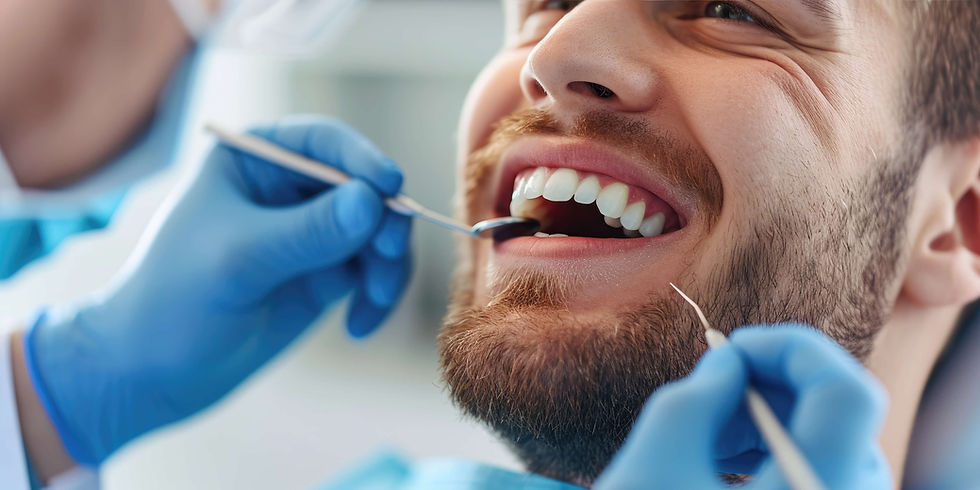Do You Really Need to Floss Every Day
- Artisan Dental Team

- Jul 8, 2025
- 1 min read
Updated: Aug 13, 2025
Flossing is one of those oral hygiene practices that often sparks debate. While some swear by its benefits, others question its necessity. But what's the real story?
Do you need to floss every day to maintain healthy gums and teeth? Let's delve
into the details and see what dental experts have to say.

Healthy gums are crucial to your overall oral health. Gums support your teeth and protect the delicate roots and bone structure of your mouth. When gums are
healthy, they are firm, pink, and do not bleed during brushing or flossing.
Maintaining healthy gums is essential to preventing gum diseases such as
gingivitis and periodontitis, which can lead to tooth loss if left untreated.
Signs of Unhealthy Gums
Unhealthy gums often present with symptoms like redness, swelling, bleeding,
and tenderness. If you notice any of these signs, it's crucial to consult a CDA
dentist or any dentist near you. Early intervention can prevent more severe dental issues down the line.
Daily Flossing Benefits

Flossing is an integral part of oral hygiene that complements brushing. While
brushing cleans the surfaces of your teeth, flossing removes plaque and food
particles between teeth where a toothbrush can't reach. Here are some benefits
of daily flossing:
Prevents Plaque Build-Up: Flossing helps remove plaque, a sticky film of bacteria that forms on teeth. If not removed, plaque can harden into tartar, leading to gum disease.
Reduces the Risk of Cavities: By cleaning between your teeth, flossing helps
prevent cavities that can form in these hard-to-reach areas.
Promotes Fresh Breath: Food particles and plaque between your teeth can
cause bad breath. Flossing keeps your breath fresh by removing these odor-causing elements.
Enhances Overall Health: Good oral hygiene, including flossing, has been
linked to a reduced risk of certain systemic diseases such as heart disease.
What Do Dentists Say?
Dentists widely recommend flossing as a part of daily oral care. The American
Dental Association (ADA) suggests flossing at least once a day to maintain optimal oral health. A dentist in Coeur d'Alene or any qualified professional would likely
advise the same, emphasizing that flossing is as important as brushing.
The Science Behind Flossing
Research supports the benefits of flossing. According to studies, individuals who
floss regularly have lower rates of gum disease and cavities. Flossing also plays a
crucial role in maintaining the overall balance of bacteria in the mouth,
contributing to healthier gums and teeth.
Alternatives to Traditional Flossing
For those who find traditional flossing difficult or cumbersome, there are
alternatives that can be just as effective:
Water Flossers: Devices like Waterpik use a stream of pulsating water to
remove food particles and plaque between teeth. They are especially useful
for individuals with braces or dental work.
Floss Picks: These small, disposable tools consist of a handle with a piece of
dental floss attached. They are convenient for on-the-go flossing and can be easier for some people to use.
Interdental Brushes: These tiny brushes are designed to clean between teeth and can be a good alternative for those who find flossing challenging.
The Role of Professional Teeth Cleaning

While daily flossing is essential, professional teeth cleaning at the dentist's office is equally important. A dentist near me or a dentist in CDA can perform a thorough cleaning to remove tartar and plaque that regular brushing and flossing can't
eliminate.
Why Professional Cleaning Matters
Professional cleaning involves scaling and polishing, which helps prevent gum
disease and tooth decay. Regular visits to your dentist allow for early detection
and treatment of dental issues, ensuring your gums and teeth remain healthy.
Tips for Effective Flossing
To get the most out of your flossing routine, consider the following tips:
Use Enough Floss: Break off about 18 inches of floss so you have enough to
use a fresh section for each tooth.
Be Gentle: Avoid snapping the floss into your gums, which can cause damage. Instead, gently guide the floss between your teeth.
Follow a Routine: Incorporate flossing into your daily routine, whether in the morning or before bed, to ensure consistency.
Conclusion: Is Daily Flossing Necessary?
The answer is a resounding yes. Flossing daily is a simple yet crucial step in
maintaining healthy gums and teeth. It complements your brushing routine and helps prevent dental problems before they start. Whether you choose traditional
floss, water flossers, or another method, the key is to make flossing a regular part of your oral hygiene routine.
Consulting with a dentist in Coeur d'Alene or any local dentist can provide personalized advice and recommendations tailored to your dental needs. Remember, a
healthy smile starts with good habits, and flossing is undoubtedly one of them.
So, the next time you ponder whether to reach for that floss, consider the long-term benefits and the expert advice urging you to keep it a daily practice. Your
gums and teeth will thank you for it!






Comments